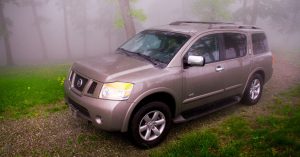 So, you’ve decided to buy a Nissan SUV. It’s a great selection for many reasons, whether its added cargo space, passenger room, higher resale value, or off-road capability. However, to truly get the full advantage of driving an SUV, you need to follow a few tips. By adhering to this advice, you’ll learn to love your SUV more than you ever thought possible. Here are a few general guidelines to keep in mind when it comes to your Nissan SUV.
So, you’ve decided to buy a Nissan SUV. It’s a great selection for many reasons, whether its added cargo space, passenger room, higher resale value, or off-road capability. However, to truly get the full advantage of driving an SUV, you need to follow a few tips. By adhering to this advice, you’ll learn to love your SUV more than you ever thought possible. Here are a few general guidelines to keep in mind when it comes to your Nissan SUV.
1. Read the Owner’s Manual
It’s not always the most manly thing to read instructions, but you’d actually find it surprising how much useful information you can find within the pages of your owner’s manual. Topics such as what fluids to use under the hood, what your dashboard lights mean, and even the radio operation are housed within this handy guide. You don’t have to read every page, but it’s a no-brainer to casually thumb through and learn about topics that interest you or ways to prolong the life of your vehicle.
2. Know Its Limits
Taking your SUV off-road after a heavy rain and watching it tear through the mud with ease is an exciting prospect. Sometimes though, it’s better to think about the risks of doing such an activity. It’s not that your Nissan SUV can’t handle the load; instead, you want to consider what happens if you’re to get stuck in the middle of nowhere. The same goes for towing. All Nissan SUVs have a maximum towing capacity for a reason and exceeding the limit might end up damaging your vehicle’s engine, suspension, or other components.
3. Improve Gas Mileage
SUVs are notorious for sucking down gas like a sieve, and even though Nissan SUVs tend to have better fuel economy than other brands, it’s still important to take steps to keep your Nissan as efficient as possible. To do this, make sure you are up-to-date with your Nissan’s scheduled maintenance plan, as it actually helps improve miles per gallon. In addition, use your owner’s manual to find the proper tire pressure. Over or under inflated tires are one of the unseen and unknown causes of poor fuel economy, so it’s best to check the pressure monthly. Plus, it’s a simple task that also improves your safety.
4. Learn How to Brake
If you’ve never driven an SUV, there are certain nuances you need to acquaint yourself with. One of those is braking. Because your Nissan SUV is larger than almost any other car on the road, it comes with a heavier weight. As a result, braking distances become dramatically longer. This means that you not only have to keep a watchful eye on the road, but you also need to brake earlier, especially in snowy or rainy conditions.
By following these tips, you’ll learn the ins and outs of driving your Nissan SUV, as well as keeping it in top mechanical condition. Before long, the relationship between you and your SUV will grow stronger, and these steps will become second nature.
Image via Flickr by pulaw


![[Facebook]](https://www.scottclarknissan.com/blogs/1043/wp-content/plugins/bookmarkify/facebook.png)
![[LinkedIn]](https://www.scottclarknissan.com/blogs/1043/wp-content/plugins/bookmarkify/linkedin.png)
![[Twitter]](https://www.scottclarknissan.com/blogs/1043/wp-content/plugins/bookmarkify/twitter.png)
![[Yahoo!]](https://www.scottclarknissan.com/blogs/1043/wp-content/plugins/bookmarkify/yahoo.png)
![[Email]](https://www.scottclarknissan.com/blogs/1043/wp-content/plugins/bookmarkify/email.png)


